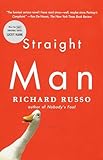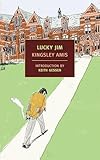
 Little known fact: MOOCs (massive open online courses) were invented by Vladimir Nabokov in his campus novel, Pnin, long before Sebastian Thrun and Peter Norvig launched their “Online Introduction to Artificial Intelligence” in 2011.
Little known fact: MOOCs (massive open online courses) were invented by Vladimir Nabokov in his campus novel, Pnin, long before Sebastian Thrun and Peter Norvig launched their “Online Introduction to Artificial Intelligence” in 2011.
During a dinner party thrown by the novel’s scholar protagonist, the Russian émigré Timofey Pnin, a Waindell College colleague suggests “lock[ing] up the students in a soundproof cell and eliminat[ing] the lecture room….Phonograph records on every possible subject will be at the isolated student’s disposal.”
When one guest protests that the personality of the professor surely counts for something, another suggests that “One could have Timofey televised.” And thus was the seed of online education planted, to bloom years later with Udacity, edX, and Coursera.
Now the University of Iowa International Writing Program is getting in on the MOOC action. The storied program is conducting its first massive open online course this summer, a six-week, “interactive study of the practice of the writing poetry.” To deliver the first “video session” for its new MOOC, Iowa is piping in the former U.S. poet laureate Robert Hass, which calls to mind his great line from “Meditations at Lagunitas”: “Longing, we say, because desire is full of/ endless distances.”
I have no doubt that the eloquent and witty Haas can bridge those “endless distances” with his presentation, but the Iowa course got me wondering about how certain fictional professors would fare in the world of online education. Which heroes of those quaint, insular works known as “campus novels” would be most adaptable to the MOOC format? Which—through eccentricity, incompetence, irresponsibility, megalomania, erudition or media savvy—could best attract the teeming hordes of online learners? I present seven candidates.
Timofey Pnin (Pnin): Laundry Hour
Pnin is delighted by the tongue-in-cheek proposal to televise his classes, logical given that he is a bit of an exhibitionist, “brazenly” displaying a bit of calf when crossing his legs in the novel’s opening scene. However, his “mythopoetic” mispronunciations and teaching style make him a less-than-ideal ideal candidate for a MOOC:
…he preferred reading his lectures, his gaze glued to his text, in a slow, monotonous baritone that seemed to climb one of those interminable flights of stairs used by people who dread elevators.
When Pnin does go off-text, he embarks on long digressions, “nostalgic excursions in broken English,” which endlessly amuse him while bemusing his students.
And yet he is not without potential for broader appeal. Perhaps a YouTube channel might be a better fit for Pnin, especially considering the slapstick comedy arising from his “constant war with insensate objects.” I for one would tune in to watch him indulge his “passionate intrigue” with washing machines. Despite being banned from using his landlord’s, he casts “aside all decorum and caution” and tosses anything he can think of into it “just for the joy of watching through that porthole what looked like an endless tumble of dolphins with the staggers.” Viral sensations have been built on flimsier conceits.
William Stone (Stoner): Copulating Verbs
 Like Pnin, John Williams’s Stoner portrays the university as a besieged asylum “for the dispossessed of the world…” Professor Stoner is a “Midwestern Don Quixote,” a “madman in a madder world.”
Like Pnin, John Williams’s Stoner portrays the university as a besieged asylum “for the dispossessed of the world…” Professor Stoner is a “Midwestern Don Quixote,” a “madman in a madder world.”
Stoner’s initial dourness eventually gives way to a brightening gloom as the protagonist’s disappointments and suffered indignities mount. When a snide colleague quips that “To Stoner, copulation is restricted to verbs,” he inadvertently gets at the truth behind the mild-mannered Stoner’s long teaching career: it is a love story. The poem that sparks Stoner’s love affair with literature is Shakespeare’s Sonnet #73, whose subject learns “To love that well which thou must leave ere long.”
Though the novel begins with a clinical assessment of a man who never rises above Assistant Professor and whom students don’t remember “with any sharpness,” it gradually reveals the intensity of a love felt for people and grammar alike:
It was a passion neither of the mind nor of the flesh; rather, it was a force that comprehended them both, as if they were but the matter of love, its specific substance. To a woman or to a poem, it said simply: Look! I am alive.
As his mistress and fellow teacher says at one point, “Lust and learning… That’s really all there is, isn’t it?” When taught by Stoner, the Latin Tradition and Renaissance Literature has never sounded hotter.
Hank Devereaux (Straight Man): Negotiation Strategies
 Richard Russo’s Hank Devereaux, the “physical embodiment of the perversity principle,” seems the most MOOC-ready professor (despite suffering from what his doctor calls a “hysterical prostrate”). Variously known as Lucky Hank or “Judas Peckerwood,” he is the entertaining chair of an English Department at a small college in rural Pennsylvania whose antics make him into something of a local TV personality. His spiritual guide is William of Occam, whose eponymous principle holds that the simplest of competing explanations is the better. The problem for Hank is that he is in the middle of a giant farce, and in farce finding any explanation, however simple, for the multiplying mishaps is itself a tricky proposition.
Richard Russo’s Hank Devereaux, the “physical embodiment of the perversity principle,” seems the most MOOC-ready professor (despite suffering from what his doctor calls a “hysterical prostrate”). Variously known as Lucky Hank or “Judas Peckerwood,” he is the entertaining chair of an English Department at a small college in rural Pennsylvania whose antics make him into something of a local TV personality. His spiritual guide is William of Occam, whose eponymous principle holds that the simplest of competing explanations is the better. The problem for Hank is that he is in the middle of a giant farce, and in farce finding any explanation, however simple, for the multiplying mishaps is itself a tricky proposition.
In his valiant effort to secure an operating budget amidst funding cutbacks and shifting priorities—the campus is breaking ground on a new “Technical Careers Campus”—Hank grasps that he must fight farce with farce. Demonstrating how to be an effective negotiator in front a pool of reporters, he makes the following threat:
Starting Monday, I kill a duck a day until I get a budget. This is a nonnegotiable demand. I want the money on my desk in unmarked bills by Monday morning, or this guy will be soaking in orange sauce and full of cornbread stuffing by Monday night.
That he is wearing a novelty nose, and holding a goose instead of a duck, in no way diminishes the soundness of his strategy in dealing with benighted administrators or tight-fisted legislatures. In terms of professors making spectacles of themselves, Hank is rivaled only by David Kepesh from Philip Roth’s The Breast.
Julian Morrow (The Secret History): “The Terrible Seduction of the Dionysiac Ritual”
 Moving from one charismatic professor to another, we encounter Julian Morrow, The Secret History’s Classics professor who encourages his Classics students to embrace their inner godheads:
Moving from one charismatic professor to another, we encounter Julian Morrow, The Secret History’s Classics professor who encourages his Classics students to embrace their inner godheads:
If we are strong enough in our souls we can rip away the veil and look that naked, terrible beauty right in the face; let God consume us, devour us, unstring our bones. Then spit us out reborn.
Set in a small New England College town, Hampden, Donna Tartt’s novel is about the bad effects of good education—or rather, a supremely, seductively good education. Guided by their brilliant teacher through the mysteries of the Greek canon, Julian’s tutees, beguiled by their teacher’s statements about the self-annihilating pleasures of Dionysian ritual, decide to try it for themselves. The unfortunate local man who is subsequently torn apart by the maddened cohort probably wishes they had majored in economics instead.
A marvelous, “magical talker,” Julian seems like the kind of Nietzschean “super professor” that critics of MOOCs fear they will create. As one of his students writes in his semester evaluation: “How…can I possibly make the Dean of Studies understand that there is a divinity in our midst?” What better spokesman for the bloviating apostles of disruptive online education than a man who can say with a straight face: “I hope we are all ready to leave the phenomenal world and enter into the sublime?”
One reservation is that Julian’s small coterie did serious damage with their orgiastic rites and fits of “telestic madness.” I shudder to think what would happen should Julian’s eloquent lectures inspire not just four students but a massive group to murderous states of Bacchic frenzy.
Jim Dixon (Lucky Jim): Facial Recognition
 Jim Dixon, the protagonist of Kingsley Amis’s Lucky Jim, is an adjunct seeking to secure a more permanent position from his “incurable evader” of an advisor. As an academic, Jim displays an “enforced avoidance of anything ambitious,” though he does exert an impressive control over his pliable face, pushing himself to put it “through all its permutations of loathing.”
Jim Dixon, the protagonist of Kingsley Amis’s Lucky Jim, is an adjunct seeking to secure a more permanent position from his “incurable evader” of an advisor. As an academic, Jim displays an “enforced avoidance of anything ambitious,” though he does exert an impressive control over his pliable face, pushing himself to put it “through all its permutations of loathing.”
“I’m the sort of person you soon get to the end of,” Dixon admits to the beautiful fiancée of his advisor’s son, an admission belied by the inexhaustible supply of faces he pulls. Grotesque though they may be, they provide a creative outlet and demonstrate a kind of genius, both of which are lacking in his dissertation: The Economic Influence of the Developments in Shipbuilding Techniques, 1450 to 1485. There is Jim’s Eskimo face, his lemon-sucking face, his mandrill face, his Evelyn Waugh face, and an improvised face so savage it doesn’t have a name:
Gripping his tongue between his teeth, he made his cheeks expand into little hemispherical balloons; he forced his upper lip downwards into an idiotic pout; he protruded his chin like the blade of a shovel. Throughout he alternately dilated and crossed his eyes.
When Jim gets the girl and a plum, non-academic job at novel’s end—the luck has to change at some point—he has no corresponding expression. A smile, presumably, would be too pedestrian, so until he has time to settle into his new, sunnier life, he settles for his “Sex Life in Ancient Rome” face, which every online learner should have in his or her repertoire.
Professors Zapp and Swallow (Changing Places): Humiliation on a Massive Scale
 It might seem perverse to mention David Lodge’s Changing Places in the context of MOOCs, given that no campus novel emphasizes the effect of physical presence on a campus—Euphoric State (UC Berkeley) or Rummidge (University of Birmingham)—on the personal and intellectual life more clearly than Lodge’s. Morriz Zapp, the author of “five fiendishly clever books” travels to England, while Philip Swallow, the stalled British academic comes to America to understand “American literature for the first time in his life…its prodigality and indecorum, its yea-saying heterogeneity.” The two professors, who begin the novel crossing each other on planes, end up with their respective wives/mistress in a hotel room, the culmination to the various kinds of cultural and sexual exchanges that occur throughout.
It might seem perverse to mention David Lodge’s Changing Places in the context of MOOCs, given that no campus novel emphasizes the effect of physical presence on a campus—Euphoric State (UC Berkeley) or Rummidge (University of Birmingham)—on the personal and intellectual life more clearly than Lodge’s. Morriz Zapp, the author of “five fiendishly clever books” travels to England, while Philip Swallow, the stalled British academic comes to America to understand “American literature for the first time in his life…its prodigality and indecorum, its yea-saying heterogeneity.” The two professors, who begin the novel crossing each other on planes, end up with their respective wives/mistress in a hotel room, the culmination to the various kinds of cultural and sexual exchanges that occur throughout.
Though Zapp can reportedly “make Austen swing,” a better use of his and Swallow’s talents would be in a course on “Humiliation,” the parlor game made famous in Changing Places. In it, players admit to not having read a canonical book. The winning player is the one whose selection has been read by the most number of other players. That is, the winner is the player who has demonstrated the most embarrassing gaps in his or her reading list. (In the novel, a hyper-competitive professor cops to never having read Hamlet; he wins the game but loses his job.)
Picture it: “Humiliation” played on a massive scale, transformed from a parlor game into a sociological survey that could reveal once and for all the most famous text one has not read. What better way to unleash two of the Internet’s greatest powers, crowd sourcing and shame? I’ll start. The Grapes of Wrath. (This is anonymous, right?)
Image via mayeesherr/Flickr











